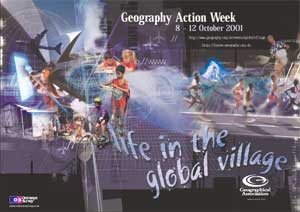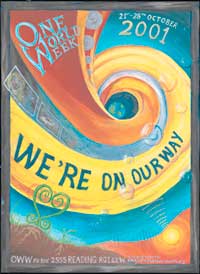| |
Geography Action Week:
October 8-12 2001
Life in the Global Village 
This year's 'Geography Action Week' organised by the Geographical
Association (GA) focuses on how we are not just a member of
a local community, but also part of a wider community, the
global village.
You can take part in the 'Big Breakfast' survey on Tuesday
9th October. Contact someone in another country and ask them
to list the food items included in their first meal of the
day, and to list any of these that were grown or reared by
members of their family. Type in your results at
www.geography.org.uk/events/globalvillage and the GA will
collate them with all the others.
To think and learn more
about global links between 8-12 October, see the 'Geography
Action Week' poster sent to schools or visit www.geography.org.uk
(choose 'action week' from the menu) for lots of ideas for
activities on fair trade, the global fashion industry, global
communications and travel.
Coffee Crisis
Despite the massive boom in coffee drinkers and coffee shops
in the UK, coffee growers are experiencing hard times as the
world price of coffee is now at its lowest level in 35 years.
 �Simon
Scoones/Worldaware
�Simon
Scoones/Worldaware |
Up to 20 million households depend on selling coffee to
buy food, clothing and education. |
But new coffee producers,
new coffee strains and more intensive, mechanised forms of farming
has led to an increase in the world supply of coffee beans,
causing the price to fall. Five years ago, farmers in the highland
areas of Vietnam began to expand the areas under coffee cultivation.
Today, Vietnam is the world's second biggest coffee producer,
yet the collapse in prices has left many of these farmers in
poverty. The environment is suffering too. Large forested areas
of Vietnam's Central Highlands have been burned and cleared
to make way for more coffee plantations.
Coffee producers in traditional coffee-growing areas are faring
no better. In Indonesia, some farmers have shifted to rice cultivation
instead, and some coffee plantations have remained unharvested.
In the Colombian Andes, 30% of small coffee farmers have already
gone bust, and some others are turning to coca and poppy cultivation,
the raw materials for cocaine and heroin, as their only means
of survival.
Nevertheless, the fall in world prices is not reflected in the
price of a cup of coffee on the high street, and owners of coffee
shop chains have announced growing profits in 2001. More of
the profit is used to pay for the high rents of coffee shops
in inner city locations, the wages of their staff, and the marketing
of the brand. Meanwhile, the share of the profit received by
coffee producers has fallen from 40% to 16%.
Visit Action Aid's website, www.actionaid.org/campaigns/coffee.html
to find out about the possible impact of genetically modified
varieties of coffee bean on small coffee farmers.
One World Week
One World Week between 21st-28th October is your chance to join
thousands of others in doing your bit to celebrate, learn and
act for a fairer world.
Contact the One World Week office at
PO Box 2555,
Reading
RG1 4XW,
Tel: 0118 939 4933,
Fax: 0118 939 4936 or
E mail: [email protected]
to receive the One World Week action pack, providing posters,
thought-provoking stories and ideas for action and campaigning.
The pack costs �7.50 including P&P.; |
|





